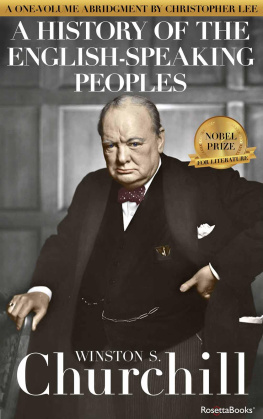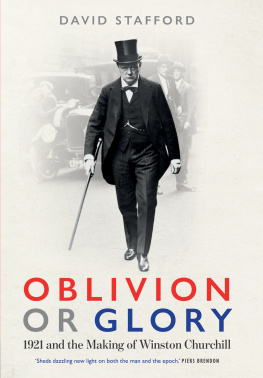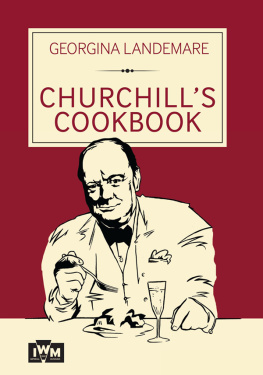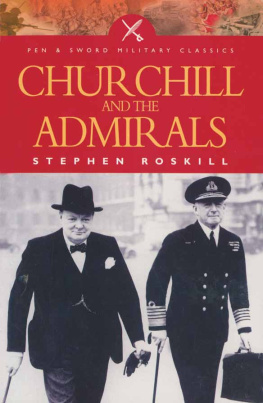CHURCHILLS FOLLY

ALSO BY CHRISTOPHER CATHERWOOD
Why the Nations Rage: Killing in the Name of God
Whose Side Is God On?: Nationalism and Christianity
Christians, Muslims and Islamic Rage: What Is Going On and Why It Happened
The Balkans in World War Two: Britains Balkan Dilemma

CHURCHILLS FOLLY
How Winston Churchill Created Modern Iraq
Carroll & Graf Publishers
An Imprint of Avalon Publishing Group Inc.
245 West 17th Street
11th Floor
New York, NY 10011

Copyright 2004 by Christopher Catherwood
First Carroll & Graf edition 2004
First Carroll & Graf trade paperback edition 2005
All rights reserved. No part of this book may be reproduced in whole or in part without written permission from the publisher, except by reviewers who may quote brief excerpts in connection with a review in a newspaper, magazine, or electronic publication; nor may any part of this book be reproduced, stored in a retrieval system, or transmitted in any form or by any means electronic, mechanical, photocopying, recording, or other, without written permission from the publisher.
Library of Congress Cataloging-in-Publication Data is available.
ISBN: 978-0-4650-6097-9
9 8 7 6 5 4 3 2
Distributed by Publishers Group West
To Richard and Sally, two very special friends without
whom this book would never have happened. And to
Paulette, my wondrous wife and most special friend, who
makes all my books possible.
CONTENTS


M ost authors conclude their acknowledgments by thanking their long-suffering and patient spouse. So let me break with tradition and start by thanking minemy wife Paulette. She is my constant muse, best critic, inspiration, friend, soul mate, encourager, and far more besides. No thanks to her could ever possibly express the debt of fullest gratitude that I owe to her.
So far as family is concerned, my parents, Fred and Elizabeth Catherwood, most kindly gave me an office in the attic of their home in Balsham, where I can work in beautiful, tranquil, and highly conducive fifteenth-century settings. To them my thanks is also profound.
I was once an editor myself, so I would next like to give warmest possible thanks to my three splendid editors, Philip Turner of Carroll & Graf in New York, and the excellent freelance editor he chose, Doris Cross, also in New York; and in London, Nicola Chalton of Constable & Robinson. I know what a difficult job being an editor can be, and no three people could have done it better. My most heartfelt thanks go to them all.
This book also arose, indirectly, out of conversations with several friends, especially Richard Reynolds, the legendary bookseller at Heffers in Cambridge, and Gene Brissie, the equally revered doyen of publishing in New York. Richard introduced me to another much-loved character of the publishing world, Andy Hayward, of Constable & Robinson. Andy in turn enabled both Gene and me to consolidate a happy link with Carroll & Graf. To all of them I owe profound thanks, and since Richard and Sally Reynolds are two of my and my wifes dearest friends, the dedication of this book to them is thus fully deserved.
Very special thanks must go to the first-class and efficient staff of the Churchill Archives at Churchill College, Cambridge. The vast majority of the documents quoted in this book are to be found in the archive, especially in Chartwell Papers 16 and 17, which deal with the Iraq issues during Churchills time as Colonial Secretary. These papers are a treasure trove, and their preservation is something for which generations of historians have had cause to be very grateful.
I need to add here that I am also more than grateful to the archives staff and to the copyright holders of the archives (the Churchill family for private correspondence and the British government for Churchills official correspondence) for their very kind permission in allowing me to quote from the many letters and papers that Churchill wrote back in 1921 and 1922.
I have the pleasure of being attached to several splendid academic bodies, all of which made this a much easier book to write. (Here, as always, I must add that any mistakes or differences in interpretation in this book are my fault and not theirs.)
The first of these is the University of Richmond in Richmond, Virginia. This university has me as a teacher every year in their annual summer school, which enables me to teach a group of highly intelligent, often slightly older, mature students about the subject of whatever book I am writing at the time. Warmest thanks, therefore, to Pat Brown, Cheryl Callahan, David Kitchen, Michele Cox, and Krittika Osanit for making this annual event possible. Not only that, but the History Department makes me a Writer in Residence, with awesome facilities generously given to meso long as a book appears. The present book is the product of such a recent visit, and I am more than grateful to the legendary John Treadway and his equally delightful colleagues, Hugh West (the Department Chair), John Gordon (his predecessor), Robert Brencher (for lending me so many helpful books), and Bob Kenzer, all of whom have been models of encouragement and kindness. The warmth of everyone toward a visiting Briton and his British ways could not be greater.
Still on the same side of the Atlantic, I am also continually grateful to my friends Professors A. E. Dick Howard and Larry Adams of the University of Virginia. My re-entry into academic life and my rediscovery of the history of the Middle East owe much to both of them, not least for their helping John Treadway get me a much-needed fellowship in 2001 at the Institute on Violence and Survival at the University of Virginias Virginia Foundation for the Humanities and Public Policy.
My debts of gratitude in Cambridge are almost too many to mention. I will start with Professor Geoffrey Lee Williams and his wife, Janice, who run the American-linked Institute of Economic and Political Studies (INSTEP). It is affiliated with Wake Forest, Tulane, Villanova, and several other well-known American universities; and it is teaching history for them that enables me to spend the rest of my time indulging in that increasingly rare academic luxurywriting books. Major thanks go to them and to the mutual friend who linked us, Dr. Philip Towle, the distinguished former Director of Cambridge Universitys Centre of International Studies.
Next page















